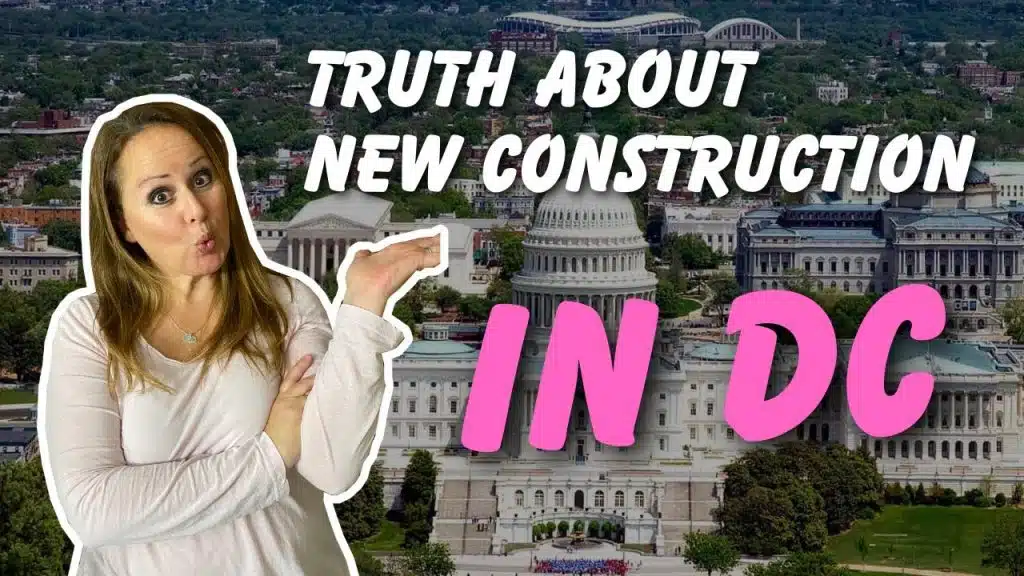The TRUTH About Buying New Construction Homes in DC
There used to be days where if you wanted a new construction home, you went to one of several builders in the area and purchased a home in a subdivision. In the 90’s and 2000’s, people moved farther out to chase affordability and new construction. Then the 2008 bubble happened, and as people started realigning priorities, there was a shift to want to be closer to the city. Citing quality of life, i.e. less time in the car, people started moving back.
Then the market got better! And then there was Covid! And then people started moving all over the darn place. Regardless, the landscape of new construction and what that entails has changed drastically over the past 20-30 years in the DC Metro Area.
What you will find are mini communities with 4-5 houses clustered together in what developers call “infill” lots. You won’t see communities with 50-100 homes until you get much further from the city.
That said, there are a couple different markets in which you can purchase a new construction home.
Subdivisions in the Suburbs
When you think of new construction, if you are thinking tract houses and subdivisions, you’re going to have to look further from the city. In fact, there is very little of this type of community ITB, or inside the beltway. If you want to be in a subdivision, you can start with the New Homes Guide. They maintain lists of all the communities where new homes are being built. These are big builders who want economies of scale, so they look for places where they can build hundreds of homes, not just a dozen. You will have amenities – club house pool, etc. MD and VA, rarely in DC. I worked for two national builders in the DC Area, and what I can say here is you are not going to get a custom product, nor will you have a ton of flexibility. But you will get a quality product for the most part – depending on who the subcontractors are at the time you buy.
Things to know:
Yes, you can bring your agent with you to these communities and yes, the builders will pay their commission. You should have an agent who is familiar with working with these large regional or national builders. Why? Because they can tell you the traps when buying new construction. Builders don’t make a ton of money on the base house, they really make their money with exorbitant markups on options and upgrades. Some are worth it, some are not.
Smaller Communities
When you think of new construction, if you cringe at the idea of something cookie-cutter, there are a host of local builders in the area who build anywhere from a few to a hundred homes a year. There are dozens of these types of builders who have made a very good living and business here doing this type of work. You will find custom builders who do 3-4 homes a year, and there are larger builders who build 20-100 a year. These builders typically work off plans they own and are what you may call semi-custom. You can make some changes to their plans but usually nothing structural aside from an optional sunroom or bump-out. Because of their small size, these communities will not have amenities. These homes are typically in more established residential areas where there may have been a parcel of land that had been overlooked, or a Developer who was able to work out an agreement with the jurisdiction granting approval for development. Sometimes there are pieces of land where 10 developers have attempted to get approved but they all fail, and it’s the 11th developer who makes it happen. I know because I’m married to one such magician. The man is honest and charming, and people just believe in him.
Things to know:
Yes, you can bring your agent with you and usually the builder pays the commission or some portion of it. Smaller builders are generally more flexible with you and view you as a client, not just a customer who can “take it or leave it” when it comes to their product.
Teardowns
If neither of these options sound appealing to you because you want to be really close to a long-standing retail and commercial area, buying a Teardown is another way to buy a new home. Teardowns are wildly popular here. Someone – either you or a builder, buys an old house that’s either in need of so much work or has an obsolete floor plan for today’s buyer. They tear it down and build a new house on the lot.
Things to Know:
Finding the house on your own can be a full time job. This is why builders make a really great profit when they purchase the home and then rebuild a new home on the lot. This isn’t something you can find publicly listed, it typically entails door to door visits, phone calls, and lots of personal conversations with people to find a home.
New Construction in DC
You won’t see many teardowns in DC though they do exist. Often the homes are renovated in a “down to the studs” fashion. For some reason it’s become common to call these people “Developers” but I take issue with this. They aren’t developing anything. My smarty pants husband is a true developer. He brings in utilities, fights for zoning, has to improve other amenities in the neighborhoods, kisses the adjacent neighbor’s asses who, even though they don’t own it, thought that field outside their living room window would stay empty forever – all for the right to develop a community of lots which then get sold to a builder.
What you see here are builders at best, flippers at worst. Flipping has a negative connotation here, mostly due to the fact that the whole permit process is as much of a trainwreck as Britney Spears’ now-deleted Instagram.
New Construction in Maryland and Virginia
The classic subdivision has moved further out. Most of Montgomery County on the Maryland side, and Arlington, Alexandria and Fairfax on the Virginia side are already developed. You won’t find much of the 100+ home subdivision but there are many opportunities for teardowns and some other opportunities for smaller two to maybe 10 home communities. If you want land, space, and community amenities like pools and clubhouses, then you’re likely going to Frederick County Maryland and out to Loudoun and Prince William County in Virginia.





